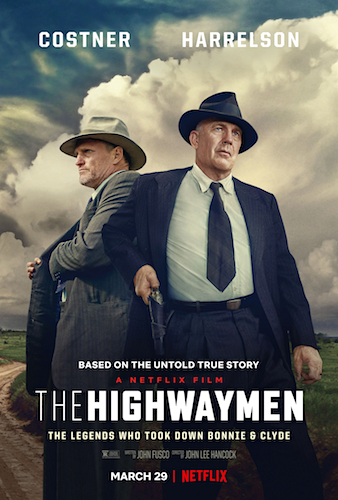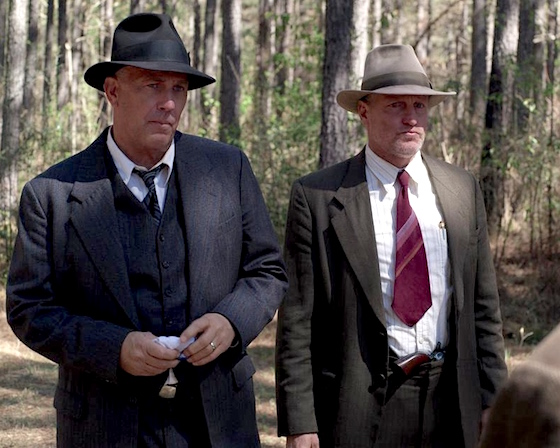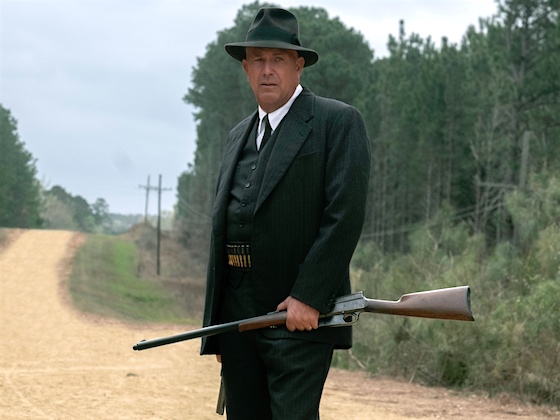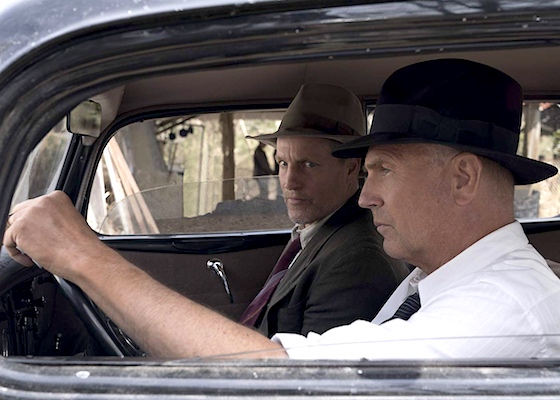John Lee Hancock | 132 mins | streaming (UHD) | 2.35:1 | USA / English | 15 / R

There’s a fair chance you know the story of Bonnie and Clyde thanks to the acclaimed 1967 movie (or the 2013 miniseries, or one of the other fictional depictions, or just their general notoriety), but what about the story of the guys who got ’em? For all the Robin Hood-esque heroism that was conveyed upon them by the media at the time and then cemented in subsequent fictional retellings, they were still murder-happy criminals. The Highwaymen sets out to do its part in rectifying this by introducing us to Frank Hamer (Kevin Costner) and Maney Gault (Woody Harrelson), a pair of retired Texas Rangers who were reinstated in early 1934 to track down Bonnie and Clyde and put an end to their crime spree.
Netflix has self-described the film as “The Untouchables meets Public Enemies” (they’re doing the job of reviewers for us!), and, while I’ve only seen one of those movies, I don’t think they’re far wrong. Netflix are well known for commissioning projects that are similar to other stuff people like (reportedly their first-ever original, House of Cards starring Kevin Spacey and produced/directed by David Fincher, came about because statistics showed viewers liked to watch the original BBC series, movies starring Spacey, and movies directed by Fincher), but this feels like one of the most blatant examples I’ve personally seen. Movies like Live by Night and Road to Perdition also came to my mind whilst watching, but it’s not limited to specific examples — it just feels like other movies set in about the same period about the same kind of thing. Well, we might blame Netflix’s data-centric thinking for that, but it’s actually nothing new in Hollywood.

As a work in its own right, The Highwaymen is a solid period investigative thriller. It’s distinctly lacking the youthful verve and excitement of the ’67 film, which matched the youthfulness of its killer couple, replacing it instead with a slow-ish, world-weary methodicalness, which again matches its central pairing. That could be deliberate, or it could just be another instance of the recurring problem that Netflix-originated content is slower than it needs to be. When police procedurals are slow because they’re focusing on the exacting, gradual accumulation of evidence and data that leads to the downfall of the bad guys, that can be a good thing, and there’s an element of that here; but at other times it just feels a bit tardy. What it lacks is a sense of urgency, which you’d think the hunt for ceaseless murderers would have. We’re told these villains need to be stopped ASAP, and we see them continue to commit crimes as our heroes are still hunting for them, but we never really feel any sense of desperation to get the job done. Hamer and Gault kinda toddle along, as if they know it’s going to take two hours of movie-time to complete their mission so why rush?
It’s not helped by a seeming indecisiveness about what the movie wants to focus on. It’s torn between being a portrait of aged lawmen who may be past their time and a straight-up recounting of the hunt for Bonnie and Clyde. The former is a theme it only touches on in fits and spurts, often in scenes that feel shoehorned in just to address that subject. I’m not sure it had much to say about it either. It doesn’t come to the conclusion that the old ways are the best, or that they’re not relevant anymore; or that these guys still have their skills, or that they don’t anymore (early on there’s a scene where Costner realises he isn’t as accurate with a pistol as he used to be; that never comes up again) — they’re old, they’re tired, and… that’s it. As for the investigation, I presume it’s been depicted fairly accurately — the film has the feel of a story that’s been structured and paced this way because it’s based on truth. Of course, as we know from many other “true story” films, that’s a foolhardy assumption to make. Still, the final ambush was staged exactly where it really occurred out of a desire for historical accuracy, so it’s not wholly unreasonable to suggest that extends to the rest of the film.

One fascinating aspect of this particular case is how much the public were on the side of the criminals, and have been since (when The Highwaymen’s trailer debuted, I saw plenty of comments from disgruntled viewers hoping the film would acknowledge how underhanded the cops were in how they finally got Bonnie and Clyde! As if it somehow wasn’t fair to just shoot dead these crooks who had killed multiple other law enforcement officers, and innocent civilians, without similar fair warning). Perhaps unavoidably, the outlaws’ celebrity is another theme the film touches on, but only loosely. The populous should probably have been terrified of this viciously violent gang, but that they instead exalted them had a lot to do with the social situation at the time, i.e. the Great Depression, where the banks were the enemy, and Bonnie and Clyde did rob banks. Unfortunately, it’s again a thread that’s not fully unravelled; another facet the film notes is interesting but doesn’t bother to do a whole lot with.
Visually, there’s nothing to complain about here. It’s handsomely shot by John Schwartzman, with suitably open vistas that in themselves evoke a less urbanised time, where outlaws might still be hiding in the back of beyond. There are also scenes in towns and cities that clearly had enough budget to create a large-scale feel for the period. The film reportedly cost just under $50 million, the kind of budget movie studios don’t assign anymore, but it shows why it can pay off: this doesn’t need to be a $100 million blockbuster, but it does need enough cash to dress streets and extras for the setting. Netflix are one of the few still prepared to put money into such endeavours, and it is welcome.
Elsewhere, the film’s musical score was one of the main things that reminded me of Road to Perdition, so I was amused when I saw it credited to Thomas Newman, who also composed Perdition. I’ve commented before how I sometimes like his music but other times think he sounds a bit to similar to, well, himself (his work on Skyfall distracted me by sounding like what he did for A Series of Unfortunate Events), so maybe this shouldn’t be a surprise.

Despite all those niggles I’ve listed, The Highwaymen is actually a solid viewing experience. It may not do anything original or execute elements as well as it could have, but Costner and Harrelson are engaging performers to follow around, and the story is inherently interesting enough to hold attention — it may’ve been slower than necessary, but I was never bored. The film has been described in some circles as a “dad movie”, a phrase that was also bandied around about another Netflix original earlier this month, Triple Frontier. I guess it’s being used in a reductive and dismissive sense, but, well, so what? I’m not a dad, nor of the age range being intimated by the expression, but I don’t think there’s anything wrong with a decent men-on-a-mission movie either.

The Highwaymen is available on Netflix now.
